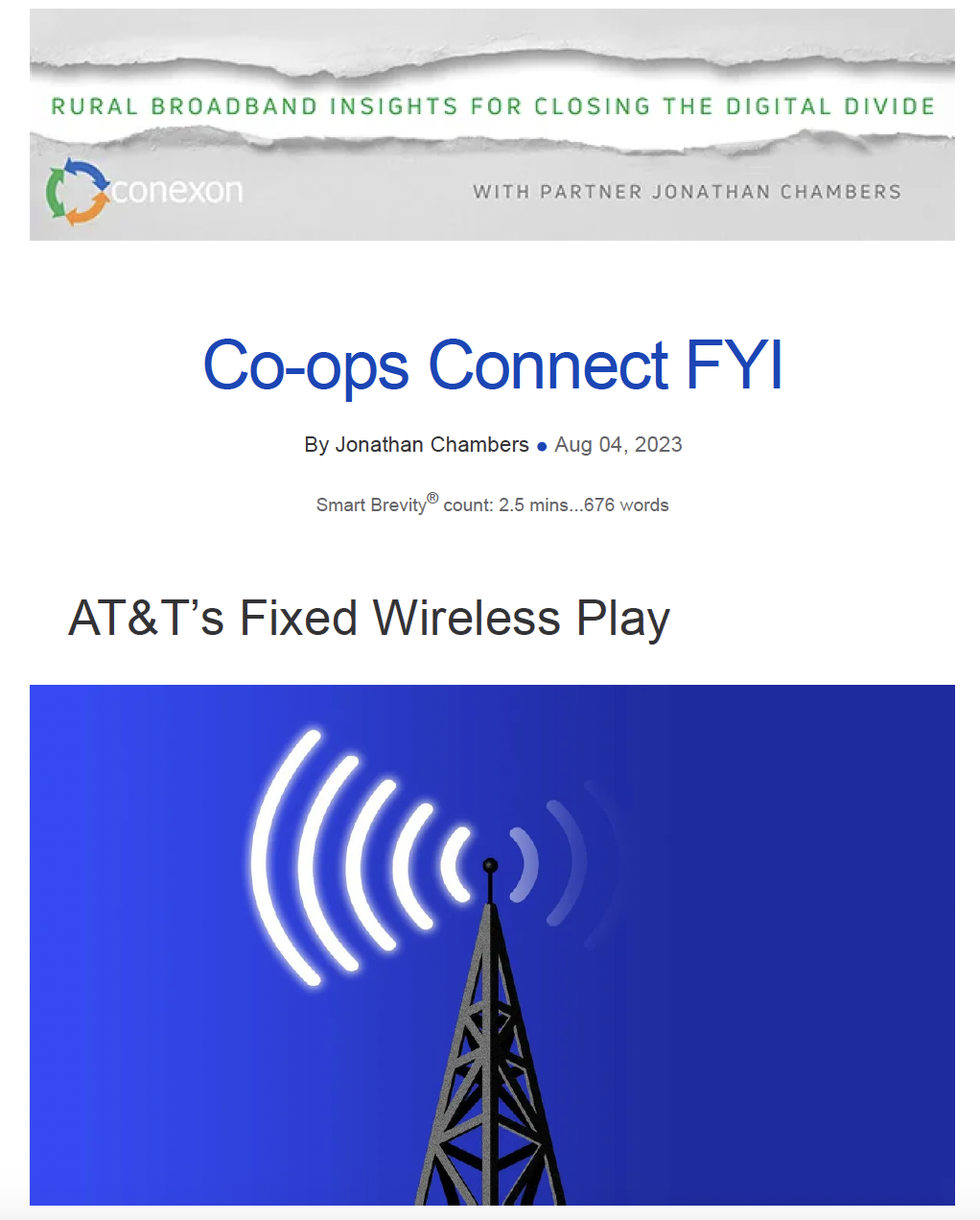AT&T's Fixed Wireless Play
August 4, 2023
“We believe fiber connectivity changes everything. That’s why we’re already one of the biggest investors in fiber in the United States. The demand for high-speed connectivity is unprecedented...”
John Stankey, CEO, AT&T
I agree with John Stankey.
“Stankey estimated that fixed-wireless services will be in demand following the allocation of BEAD funds despite the program’s preference for fiber connection, saying that fixed-wireless is the only way to connect every address in hard-to-reach geographies. He expects that AT&T’s fixed-wireless offerings will be a competitive offer in broadband builds for decades to come.”
Broadband Breakfast article (read full context here)
I disagree with John Stankey.
If “fiber connectivity changes everything,” then rural America deserves the same opportunity as urban and suburban America.
- In hard-to-reach geographies served by electric cooperatives, fiber can and should be built.
So where does this leave us?
A Small Story About AT&T
In 2012, when I worked at the FCC, AT&T officials told us that it had a 3-tier network plan for its service territories.
- It would build fiber in cities.
- It would upgrade its DSL services in denser suburban areas.
- In its rural service territories, it would let its copper network degrade, stop providing DSL service, and allow rural consumers to subscribe to fixed wireless services provided over its mobile wireless network.
In 2015, the FCC offered AT&T over $3 billion to upgrade its copper plant, giving it a Right of First Refusal over public funds. AT&T accepted most of the funds.
But then:
Several years later, those same geographic areas were put up for auction across AT&T’s service territory, when AT&T failed to build anything faster than slow DSL and wireless networks. In the CAF II and RDOF auctions, AT&T did not bid to build fiber networks and won nothing.
Why it matters:
Today’s AT&T comprises the majority of the once great Bell System -- a combination of AT&T’s long-distance assets and four of the seven Regional Bell Operating Companies: Southwestern Bell, PacBell, BellSouth and Ameritech, companies that served much of rural America for over a century.
I understand why AT&T chooses not to build fiber in rural America.
It is cheaper for AT&T to leverage its wireless network. That may or may not be in the best interest of AT&T’s shareholders.
It just isn’t in the best interest of rural America.
The big picture:
I agree with AT&T’s decision to abandon rural America.
Why? AT&T’s actions over the past decade provide the greatest opportunity in several generations for local communities to wrest control of their communications needs from the old Bell system.
The Final Word
As a nation in the 1930s, we committed loans to rural electrification. Local rural communities committed the hard work to build electric networks.
Let this generation commit to the future of rural America.
- It is far more expensive to build electric lines than fiber lines.
- Yet our grandparents got the job done.
- Building fiber to “hard-to-reach geographies” is a matter of will, not economics.
One more small story about AT&T:
A decade ago, I participated in an FCC rural broadband workshop. I tried to make the case that, rather than broadband decisions made in Washington by FCC officials, local communities should have a voice:
- A determining say in how public funds would be spent in their communities.
- A say both in the type of broadband network and the service provider.
As I left the workshop, I overheard an AT&T lobbyist say to a colleague, “Community input is totally unworkable.”
I’ll leave you with this.
There’s a lot I don’t like about BEAD, but there is one aspect I like a heckuva lot:
- Most states have set up broadband programs to ensure strong local community input. Community input will continue to play a role with BEAD funds.
To quote an old friend, Blair Levin:
“BEAD is not a once-in-a-generation opportunity. It’s a once opportunity.”
Seize this opportunity.
